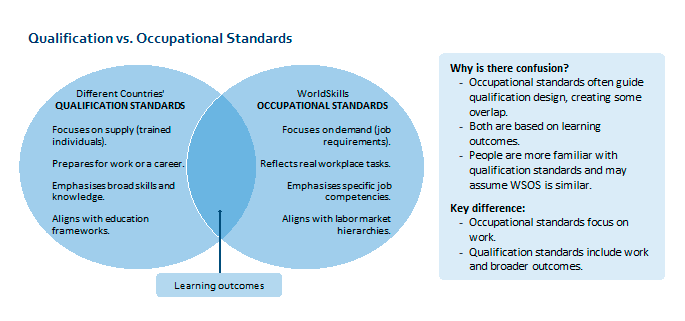Development of WorldSkills Occupational Standards Continues
The tasks and requirements in WorldSkills competitions are based on collaboratively defined WorldSkills Occupational Standards (WSOS). Finland plays a strong role in their development.
Jointly defined occupational standards provide uniform starting points for competitors and help national teams prepare for competitions. The WorldSkills standards were first published in 2012.
Occupational Standards Are Not the Same as Qualification Requirements
Each of WorldSkills' 89 member countries has its own national occupational requirements, much like Finland’s qualification criteria established by the Finnish National Agency for Education. In WorldSkills competitions, these national requirements must be harmonized to allow participation from all member countries.
However, WorldSkills occupational standards are not the same as qualification requirements. While both are based on learning outcomes, occupational standards emphasize labor market demands and real-world job tasks.

Standards Updated Through Broad Collaboration
The standards are updated biennially in collaboration with experts from various competition fields, educational institutions, and businesses. The WSOS working group coordinating the updates includes Jenny Shackleton, Sally Messenger, Eija Alhojärvi, and Teija Ripattila.
The group distributes responsibilities for updating the standards for different skill categories in cooperation with experts from various countries. The process considers diverse educational practices, the needs of businesses, and future industry trends. After each WorldSkills competition, key stakeholders in each skill category are surveyed about potential updates to the standards. Experts share their business contacts with the working group, ensuring that perspectives from as many companies as possible are included in the development process.
Additionally, the WSOS team is involved in exploring the use of artificial intelligence in standard development. In 2025, WorldSkills International will hire dedicated personnel for standards development, and the group will assist in their recruitment.
Evolving the Skills Portfolio
In addition to updating the standards, WorldSkills is also working to refresh its Skills Portfolio. This includes introducing new skills categories, deciding which categories to remove, and considering potential combinations of existing ones. Currently, 26 new skill proposals are under review. WorldSkills has invited representatives from various countries to join the working group. From Finland, Tapio Kattainen, who has extensive experience in competition management, has joined the team. Tapio has held roles such as Competition Manager for Taitaja2017, Skill Advisor, Expert, and Taitaja Head Judge.
Participation Benefits Finland
In 2024, Skills Finland’s High-Performance Training Manager, Teija Ripattila, has been actively involved in developing the standards as an expert. Skills Finland has received support from the Ami Foundation for this work. Starting in early 2025, two days per week of Teija’s work time will be allocated to WorldSkills activities, with half of this time funded by WorldSkills International.
"Finland is strongly involved because our way of integrating vocational education development and competition activities is not a given everywhere. We have valuable examples and experiments to share with other countries," Teija explains.
"We aim to contribute and learn how occupational standards are defined for different skills at the international level. This supports our national team in their training efforts. Every expert in our network plays an important role in this work. Additionally, through our experts, we gain the latest knowledge for educational institutions and businesses in Finland, which strengthens the impact of competition activities," Teija elaborates on the benefits of participating in the standards work.
Ami Foundation has funded Skills Finland’s WSOS activities in 2024. Ami is a foundation dedicated to the development of work, promoting human-centred change in the labour market by granting scholarships. The foundation’s purpose is to enhance the competitiveness and vitality of the Helsinki metropolitan area, improve the working conditions of various professional communities and individuals in the region to help them succeed in the evolving job market, and support the functionality of the local labour market.
More information

Chief Training Manager
+358 40 455 2020
teija.ripattila@skillsfinland.fi